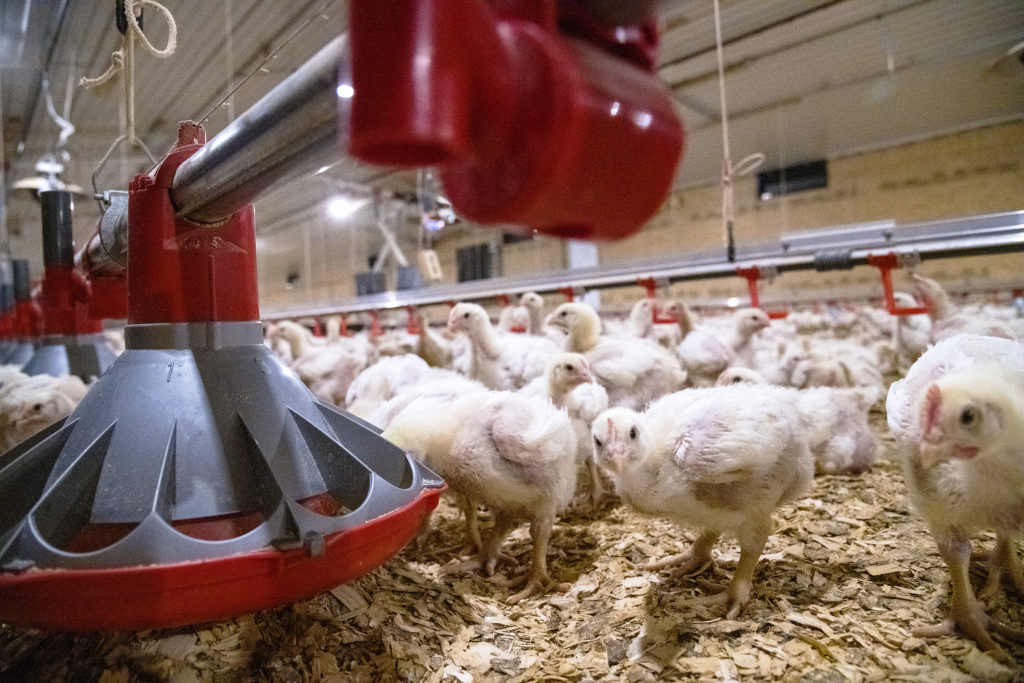The Tyler Court of appeals recently affirmed a nuisance verdict and resulting permanent injunction against an East Texas poultry farm.

(UA System Division of Agriculture photo by Fred Miller)
Background
Plaintiffs each own rural property in the Malakoff area of Henderson County, Texas. In 2015, Defendant Steve Huynh bought 231 acres of land in Malakoff to build a chicken farm. Steve previously owned and operated chicken barns for Defendant Sanderson. Both Defendants Timmy Huynh and Thinh Nguyen, relatives of Steve, were approved as growers for Sanderson, and Steve’s Henderson County property was approved as a barn site. Timmy and Thinh entered into leases with Steve to operate chicken barns on his land, although neither paid him rent.
The Defendants built 16 barns that could house 444,800 birds on the property. The first flock of birds was placed on the property in June 2016. All sixteen barns were operational by November 2016. The evidence showed that the chickens produced 5 thousand tons of manure per year. Additionally, there were composting sheds on the property where dead chickens were placed in layers and covered by wet litter and manure.
Shortly after the barns began operating, the Plaintiffs noticed odors. They complained numerous times to the Texas Commission on Environmental Quality (TCEQ). The TCEQ investigated the complaints and issued notices of violation to the farm and the various entities, owners, and tenants. When the odor did not improve after the TCEQ’s notices of violation, the Plaintiffs filed suit. Claims involved fraud, nuisance, trespass, and intentional interference with property rights. They sought monetary damages and a permanent injunction to prevent chicken farms from being operated on Steve’s property.
At trial, a jury sided with the Plaintiffs, finding that the defendants caused a temporary nuisance. They jury awarded monetary damages for the decrease in market value of the Plaintiffs’ homes. After post-trial motions, the judge entered an order that the Plaintiffs should be awarded no monetary damages, but entering a permanent injunction. The Defendants appealed.
Appellate Court Opinion
The Tyler Court of Appeals affirmed. [Read full opinion here.]
The court addressed four issues raised by the Defendants.
Sufficiency of the evidence on nuisance finding
A nuisance arises when the action of a defendant substantially interferes with the use and enjoyment of another person’s property.
Defendants argued there was no evidence of substantial interference with the Plaintiffs’ use and enjoyment of their properties, there was no evidence of unreasonable discomfort or annoyance, and that there was insufficient evidence to prove the chicken barns were the cause of the alleged harm.
The court addressed the evidence related to the nuisance claim. First, the court noted that the TCEQ guidelines indicated that the number of birds present was twice that which TCEQ deemed likely to cause a persistent nuisance odor. Additionally, a Sanderson division manager testified that dead chickens–like those in the composting sheds–have a rotting odor. An agricultural engineer testified that chicken manure is “offensive” and “smells bad.”
The court also noted the claims made to TCEQ. In October 2016, Plaintiff Ronny Snow called the Sanderson production office to complain about he odor. Two days later, a TCEQ investigator documented odors and stated that the chicken houses were the source. The investigator’s report deemed this a violation of Texas regulation and statute and issued a notice of violation requiring the farm to submit a plan to address the outstanding violation and prevent further occurrence. Between that time and June 2017, the TCEQ documented 62 odor complaints and issued several notices of violations.
The court also noted that there were odor logs from the Plaintiffs, detailing hundreds of odor events. The Plaintiffs testified that the risk of exposure caused the Plaintiffs to refrain from planning and enjoying outdoor activities. All Plaintiffs owned their property prior to the chicken farms being built and testified they frequently used them for outdoor activities and entertaining prior to the barns being built.
Based upon this evidence, the appellate court found there was sufficient evidence to support a finding of a nuisance. The trial court was affirmed.
Permanent injunction
Next, the court addressed the Defendants’ claim that a permanent injunction was not proper as the Plaintiffs have an adequate remedy at law (monetary damages) and lack imminent harm.
Generally, injunctive relief is available only when the legal remedy of damages is inadequate. However, when the nuisance at issue is recurring in nature, an injunction may be issued irrespective of a remedy at law being available. A nuisance is recurring in nature if the defendant will not cease the nuisance without a court order.
The court noted testimony from Sanderson corporate representatives who said the farms did everything according to Sanderson rules, and that there would be no change in anything with respect to how the farms operated, despite the lawsuit and the odor violations from TCEQ. They also noted that despite the prior notices of violation, the odor problems continued. Thus, the trial court affirmed that this was a recurring nuisance for which an injunction is proper.
Moreover, even if an injunction were an allowable remedy, Defendants argued that Plaintiffs did not face any imminent harm. Because the trial court found that the nuisance would recur, imminent harm did exist. Further, the fact that the nuisance was temporary rather than permanent, an injunction was still an available remedy under Texas law.
Balancing the equities
Defendants argue that the balancing of equities favors rejecting the permanent injunction.
For injunctive relief to be granted, the court must balance the equities and relative hardships on the parties to the lawsuit and on the public.
Here, the trial court did this balancing of equities, finding that if not enjoined the activities causing the nuisance would continue, that Sanderson had other growers that could absorb the flocks currently at the farm with little economic impact to Sanderson, and questionable testimony from the Defendants regarding who actually runs the farms, who signed documents, who files taxes, and who receives government substances. Further, Sanderson testified it has 900 chicken barns supplying 2 East Texas plants that could absorb the chickens from these 16 houses. Thus, the court affirmed that the balancing of equities favors the injunction.
Breadth of the injunction
Finally, the court addressed the breadth of the injunction, which orders the Defendants and Defendants’ affiliates to “cease and desist from conducting and from allowing any other person to conduct any of the Activities” on Defendants’ Properties or on any other real property subject to the Defendants’ ownership within 5 miles of the Plaintiffs’ properties. The court found that this injunction applied only to parties in the case, including the individual persons, LLCs or other corporate entities, and Sanderson. Thus, this argument was overruled.
Key Takeaways
This case is an important reminder of the conflict that can raise between agricultural production facilities and neighbors.
Probably the most important thing for agricultural operations to consider in this situation is the relationship with neighbors. Taking the time to get to know your neighbors, talk with them, offer to address any concerns, can all go a long way to avoiding a nuisance lawsuit like this. It is also important that agricultural operations take seriously any nuisance complaints or notices of violation and take whatever steps available to try and abate the nuisance.
Additionally, although not raised in this case, it is impossible to talk about agricultural operations and nuisance without mentioning Right to Farm laws. Texas has a law that offers a defense to ag operations facing nuisance lawsuits if certain criteria are met. This includes that the operation needs to be in operation unchanged for at least 1 year prior to the complaint and that the operation cannot be in violation of state or federal laws. If you are involved in agriculture, I would encourage you to read your state’s Right to Farm law, be familiar with its provisions, and ensure you have taken steps so that this defense will be available in the event a claim is made. To read more about the Texas Right to Farm Act, click here and go to page 81. To find the Right to Farm statute in your state, click here.











